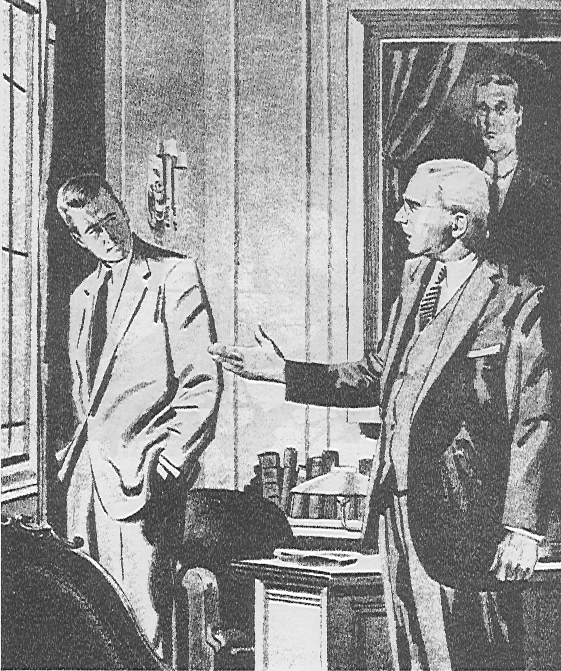
Look at this picture and tell us a story about what you think is happening. Be descriptive and complete.

Here is an example of a story written to determine how someone might "frame" what is happening. Read the following story someone else wrote, and using the guidelines, score the story for the presence or absence of frames.
STORY TOLD IN RESPONSE TO PICTURE
The two men in the picture are co-workers. The picture in the
background is of the president of the company where they work. The older
man named Bill is the boss of the other. Bill is not very happy with the report
that Jim wrote and he is getting ready to give him some constructive criticism.
Bill thinks Jim hasn't been taking his job very seriously lately. This is not
the first time that Bill thinks Jim's work has been less than acceptable. Bill wants Jim to
understand that this shoddy work will not be tolerated much longer. Jim is happy
to to get by; he doesn't like the job much anyway and will probably quit to
leave town with his girlfriend who's looking for a new job. Bill's thinking that
Jim has a bad attitude; Jim's thinking that Bill ought to get a life. Bill
finally demands that Jim cancel his lunch appointment so that they can go over
the report together. At lunch Bill makes it clear to Jim that his work must
improve or he'll be put on probation. Jim leaves the meeting and goes right to
the president to
complain about being harassed.
Jim's girl friend is the President's favorite
niece but Bill doesn't know it. Jim, the niece, and the President and his wife
have recently spent a week at the president's summer home. Bill is unaware of any
of this. In the end, Jim will leave with the niece move to another town
where the niece wants to live. It's Bill who gets fired.
Instructions for scoring
Criteria for scoring
Okay, here's the way I would score it:
For the structural frame. Initially this is an easy call. We are first told about the lines of authority. Since Bill is identified as the boss and Jim the subordinate. I'll give one point for that. The President is part of the story, add a point. There is no score for unique accomplishment, or for a short-term or long-term goal. No structural score there. But there are concerns for standards of performance so we score one more for the structural frame.
Structural Frame = 3
Now for the political frame. This interpretation is also fairly easy. Both Bill and Jim, at the end of the story, are emotionally concerned about getting control. Score one point for the political frame. Also, Jim is actually doing something about it (so is Bill), so there's one more point. And because we have a manager/subordinate relationship in which the Jim is pulling rank, we score one point for that, too. Because, Bill gets axed in the end, score another for the political frame. Because Jim is unashamed about apparently using his relationship with his girl friend to get at Bill, score another political point.
Political frame = 5
For Human Resource Frame There's nothing very warm and fuzzy about this boss-subordinate relationship: no positive emotional relationship, no one cares about being liked, and this certainly isn't an affiliative activity. But a friendship with a girl seems to matter for Jim, so score one here. Obviously, President cares for both Jim and his niece, score another one of the HR frame.
Human Resource score = 2
For the Symbolic Frame. This is a frame for which there is little to score. For example, we do not have the boss discussing the symbolic importance of existing practices, rituals or artifacts. No talk of vision or values, no reference to the boss as symbol, no discussions of the image that will be projected to different audiences, or about the culture of the place Not much of the symbolic frame here.
Symbolic Frame = 0
In past semesters, students have written five-ten page stories about critical incidents in their organization before they were ever introduced to any ideas about reframing . Here are the tallies of their codings Student Incidents